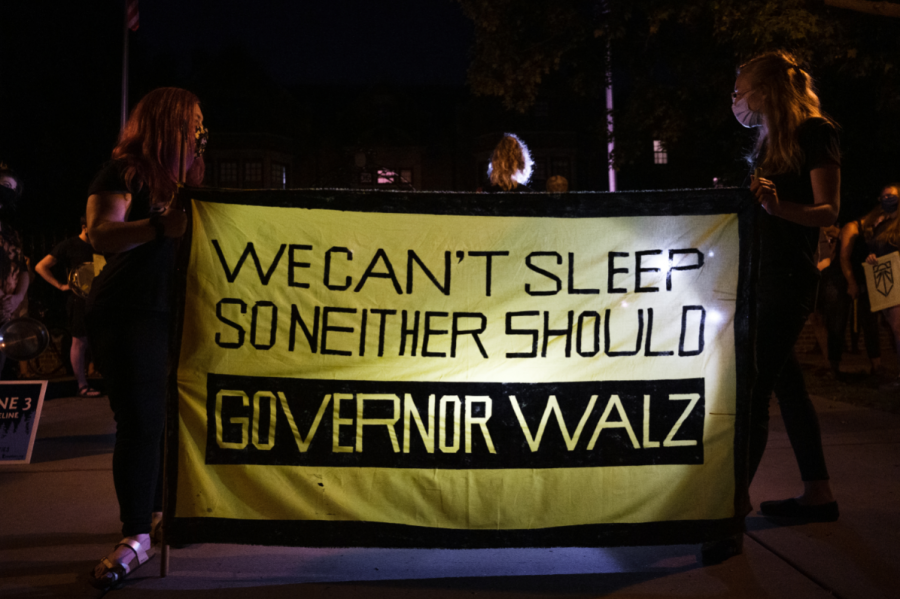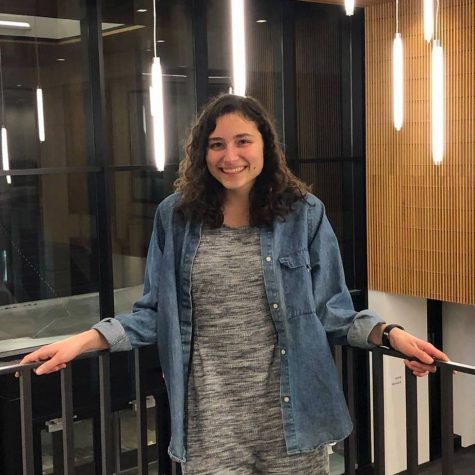Twin Cities climate groups call on Walz to challenge Enbridge Line 3
Protesters with Sunrise Movement Twin Cities hold a banner outside the governor’s mansion during the Wake Up Walz protest on Thursday night. Photo by Kori Suzuki ’21.
August 16, 2020
Over the last three days, hundreds of people joined the Sunrise Movement, MN350 and other climate justice organizations in protests and sit-ins outside the governor’s mansion to demand that Governor Tim Walz take action to block the Enbridge Line 3 pipeline.
Wednesday, Aug. 19 is the deadline for interested parties to file an appeal of the project’s certificate of need, which utility regulators last granted in February. One of those parties is the Minnesota Department of Commerce.
The Department of Commerce appeal was originally filed under former Governor Mark Dayton, and Walz previously opted to continue that appeal in February 2019. If he chooses to do so again, that opens the door for the project to face another challenge in the courts.
A group of around 50 people — most of them college-aged — gathered just after sunset on Thursday evening for a protest organized by the Sunrise Movement called Wake Up Walz. Protestors came armed with pots, pans, whistles and musical instruments, sounding off late into the night. Two held a banner reading, “we can’t sleep so neither should Governor Walz.” Protesters stayed until nearly midnight.
MN350 hosted sit-ins from 11 a.m. until 7 p.m. on Friday and a protest on Saturday afternoon that brought about 100 people to the governor’s mansion. Their pipeline resistance team is planning to repeat the sit-ins every day until the Aug. 19 deadline.
Speakers at the protest called attention to the pipeline’s environmental hazards. Line 3 would transport tar sands, an expensive substance that releases relatively high amounts of carbon when refined to make gasoline and petroleum.
Opponents of the pipeline have also pointed to the risk it poses to the Anishinaabe people and watersheds. Line 3 would run through Anishinaabe land, and a spill could contaminate lakes and rivers that are crucial sources of both water and wild rice.
Sasha Lewis-Norelle ’21, one of the organizers of the Wake Up Walz protest, said that this is a crucial moment in the fight against Line 3.
“We are mainly trying to get Governor Walz to refile the Department of Commerce appeal, because that is a really urgent aspect of his fight,” Lewis-Norelle said. “If he doesn’t, that would basically be his greenlighting Line 3, which would be a huge blow for human rights, the environment, climate change, our futures [and] our trust in him as a politician.”
Several other parties, including the Sierra Club and other Indigenous rights and environmental groups, have already filed appeals. Margaret Breen ’20, an organizer with MN350’s pipeline resistance team, noted that the Department of Commerce brings a unique economic perspective and level of influence.
“The arguments that the Department of Commerce can make are unique and are not represented by other parties, and that’s why it’s so necessary,” Breen said. “It’s not like if they don’t do it somebody else can just jump in.”
The economic benefits of the pipeline have been a contentious point in the legal battle over its construction. Supporters of Line 3 point to the jobs it could create and the profits that could be made from transporting oil.
In June, Minnesota’s Public Utilities Commission denied petitions for reconsideration of the project that pointed to a decreased demand for oil since the onset of the coronavirus pandemic. The Commission found that the need — and economic benefits — of the pipeline were still strong enough to merit its construction.
One speaker at the Thursday night protest who only identified himself as Eric is a nurse in Chisago City. Some of his family members in central Minnesota work for pipeline and oil companies. Those jobs are opportunities for some in rural areas to make a living, but he wishes there were opportunities that didn’t contribute to environmental damage.
“I love my family members, I would just really like to see other options available to us,” he said. “Right now people are going to take that kind of work if that’s what they have. What if we start to work together… figuring out ways to bring in truly renewable clean energy?”
“I don’t want to shame those who are concerned about making their own livelihood,” he continued. “I want to see all of us work together to find better solutions.”
While protestors called attention to the importance of the upcoming deadline and Walz’s decision, speakers at both the Sunrise and MN350 events spoke to the context of this moment in the Line 3 fight.
Several protestors highlighted the ties between the ongoing Black Lives Matter movement and the movement for climate justice. This summer, Lewis-Norelle has seen a reckoning with what is considered normal. If communities can challenge the concept of policing, he said, then we can challenge the norms of energy use, too.
“So many people are saying that we rely too much on fossil fuels, like it would be too hard to transition away from them,” Lewis-Norelle said. “Let’s start reimagining a world where we do.”
Many protestors referenced the 2016 movement in Standing Rock to block the Dakota Access Pipeline, as well. Breen and several others described Standing Rock as the catalyst for their involvement in the fight against Line 3.
Robert Pilot, an activist and founder of Native Roots Radio, took the megaphone at the MN350 protest with a message for the governor. Whether Line 3 gets another day in the courts, he said, it is certainly not clear of challenges.
“I see a lot of people that went to Standing Rock that were protecting the water,” Pilot said. “We learned how to camp, and we learned how to protest peacefully, and we will do that again.”














